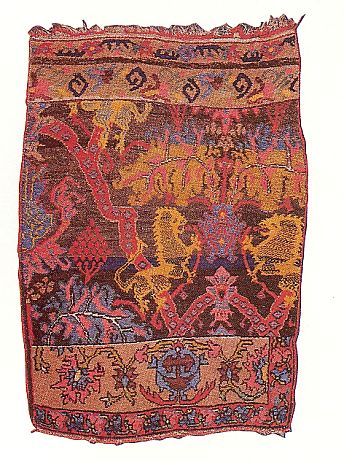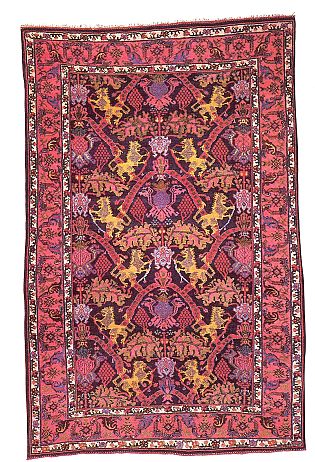Posted by R. John Howe on 09-04-2006 06:36 PM:
Bijar Lion Vagireh and Lion Rug
Dear folks -
By chance I happened to be looking again at the ORR volume that treated Bijar
weaving extensively and noticed that there was a Bijar vagireh pictured with
a lion field design.
This is one of the old classic Bijar designs and in fact John Collins had provided
some examples and discussed them.
I thought it might be interesting to see a vagireh of a particular design close
with a rug with a quite similar one.
Here is the Bijar vagireh with a lion design in its field.

And here is a complete Bijar rug with a very similar field design.

Finally, here is a detail of this complete lion rug.

Bijar lion rugs are valued by collectors.
Regards,
R. John Howe
Posted by richard tomlinson on 09-06-2006 07:05 AM:
hi john
is there a difference between a wagireh and a vagireh?
i know there are different spellings for such words but i generally pick one
spelling and stick with it ( eg shahsavan - i never use shahsevan or any other
alternatives)
regards
richard tomlinson
Posted by Chuck Wagner on 09-06-2006 07:36 AM:
You say tomato, I say domado
Hi Richard,
The difference is: You can pronounce a "v", and most Persians can't.
Regards,
Chuck Wagner
Posted by Richard Larkin on 09-06-2006 07:54 AM:
travel is broadening
It brings to mind the guy who traveled to Hawaii. He was never sure how to
pronounce it. He arrived at the airport and turned to a fellow nearby.
"Excuse me," he said, "Is it 'Ha-wa-ii' or 'Ha-va-ii'?"
"Havaii," replied the fellow.
"Thanks," said the guy.
"You're Velcome!"
__________________
Rich Larkin
Posted by Steve Price on 09-06-2006 08:52 AM:
Hi Richard
Most such words are in English as transliterations, sometimes as transliterations
that were originally transliterated into foreign languages that use our alphabet
(more or less) but pronounce differently. I don't know the history of the movement
of "vagireh" or "wagireh" into English, but I suspect that the native pronunciation
begins with the sound of an English language letter V. If it came to us through
German, the first letter would be a W, which sounds like our V. The V in German
sounds like our letter F, with the hard pronunciation (as in foot, not soft,
as in of).
Here's one that I think is kind of fun: how do you pronounce, "GHOTI"? It's
"fish". "GH", as in laugh or cough; "O" as in women; "TI" as in "nation". I
don't know how anyone not native to an English speaking country ever learns
to pronounce it.
Regards
Steve Price
Posted by R. John Howe on 09-06-2006 09:19 AM:
Dear folks -
Yes, usage varies. "Wagireh" seems most frequent in the U.S. literature, but
Sabahi, whose book we drew on is Persian writing in Italian, and opted for "Vagireh."
There is an old joke about someone noticing that native-speaking Turkmen seem
to pronounce given words differently. Someone asked a Turkmen why that variation.
He is said to have replied "It depends on how many teeth your grandmother had
when she taught you to speak."
And since we're doing "w" and "v" usages, in undergrad school I had a friend
who was German and had spoken German only until age 12. He had a German accent
and was self-conscious about his ability in English (he was actually as fluent
as can be, just had an accent). He asked us once over beer if we could understand
him in ordinary parlance. Some unkind wag in the group said "Not wary vell."

We do have trouble maintaining any focus at all, don't we?
Poor little "lion" wagireh.
Regards,
R. John Howe
Posted by Steve Price on 09-06-2006 09:49 AM:
Hi All
As long as we're on this little diversion, I'll share something about it that
surprised me when I learned it: when folks from non-English speaking countries
have difficulty with certain pronunciations, it isn't always a motor problem
(an inability to generate certain sounds). In some, at least, the block is sensory.
I had a Japanese colleague visit some years ago, and he stayed in my home. At
dinner, he asked my daughter her name. "Lisa", she replied. "Ah", he said, "pretty
name. You spell it R-I-S-A?" She spelled it correctly for him. He hung his head,
"We cannot hear that distinction", he said.
Sorry; maybe best to get back to vagirehs.
Regards
Steve Price
Posted by Filiberto Boncompagni on 09-06-2006 10:13 AM:
Quite rite, Steev. 
Posted by Patrick Weiler on 09-06-2006 10:14 AM:
More Japanese
At dinner with a group of Japanese one night, one expressed that he really
liked the clams. He asked what we called them, "clams" and asked how it was
spelled. Someone said c-l-a-m, and he said "cram". I said, no it is spelled
c-r-a-m. He then said "Ah so, clam". So it is not that they are unable to pronounce
these letters, it is only that they have switched the sounds. Second generation
Japanese have no problem with them.
And speaking of the lion wagireh, it is fairly easy to see how a complete rug
could be made from this small design. But the second wagireh in a different
thread, Jerry Thompson's Subtle Sampler, appears to contain only what appear
to be border designs or minor motifs, no medallion parts or major field designs.
Perhaps it was used as one of several that were needed for one big rug.
Patlick Weirer
Posted by R. John Howe on 09-06-2006 10:56 AM:
Pat -
Interesting thought about Jerry Thompson's second wagireh (the one with lots
of green).
I'm going to ask others about your reading in that thread.
Regards,
R. John Howe





